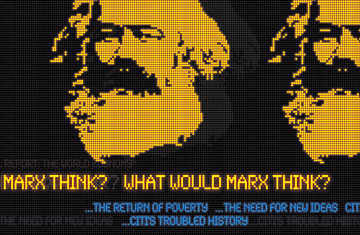
The book has been on the best-seller lists in Germany for nine weeks, and in the provincial town of Trier it has special resonance, especially in tough economic times. It's Marx's Das Kapital, and dozens of copies of it are laid out in the bookshop in Trier's pedestrian-only town center. But no, this is not the seminal 19th century work on political economy by Karl Marx, who was born in Trier in 1818. It's a book by Reinhard Marx, the former Roman Catholic Bishop of Trier who is now Archbishop of Munich and Freising. He cheekily borrowed the title for his own thesis, namely that today's troubled economy needs to reconnect with fundamental Christian values if it is to be restored to health. The book's introduction is a letter to Reinhard's celebrated namesake in which he rejects revolutionary Marxist solutions. Nonetheless, as he surveys the wreckage of the global financial system and the growing insecurity of ordinary people, the Archbishop wonders: Was Marx's critique of capitalism right after all? "It lasted longer than you expected back in the 19th century," he writes, "but could it be that capitalism is just an episode of history that will end at some point because the system will collapse as a result of its internal contradictions?" (See pictures of the Bolshevik October Revolution.)
The Archbishop is not alone. From Washington to Vladivostok, the task of warding off financial collapse and economic depression is now the overwhelming priority for government leaders, central bankers and regulators everywhere. Solutions differ, but all agree that the current situation is both dire and extremely perplexing: nobody younger than 80 has experienced such a rapid decline in global confidence and economic activity. Markets have failed, and in so doing they have destroyed the conventional wisdom about how to run an efficient economy. It's as if an intellectual fog has descended, and the global positioning system has broken down, leaving the world to grope its way out as best it can. "Ask the experts what to do," says Tony Blair, the former British Prime Minister, "and the most honest reply is 'I don't know.' "
Searching the library for ideas, many have rediscovered the 1930s policy prescriptions of John Maynard Keynes, who advocated massive government spending programs of the type now being promoted by U.S. President Barack Obama, British Prime Minister Gordon Brown and others. Other great thinkers of the past are also being rediscovered, from Adam Smith to John Kenneth Galbraith. But hovering out there in the fog, unavoidably, is the towering specter of Karl Marx, the grandfather of political economists, whose damning critique of capitalism's inadequacies played an outsized role in world history for a century after his death in 1883. (Read a TIME cover story on Marx.)
Marx's utopian predictions about revolution and the triumph of socialism were dead wrong; indeed, many of the policies carried out in his name in the 20th century brought misery to millions in countries ranging from Russia to China, and including large chunks of Africa. Yet 20 years after the fall of the Berlin Wall and Soviet-style socialism, it's still instructive to take the Karl Marx road trip around Europe, starting in Trier and ending up where he ended, in London. It's instructive because if you leave aside the prophetic, prescriptive parts of Marx's writings, there's a trenchant diagnosis of the underlying problems of a market economy that is surprisingly relevant even today. Marx, too, lived through an era of rapid globalization. (A famous passage in The Communist Manifesto, which he wrote with Friedrich Engels in 1848, is almost uncannily prescient about globalization's costs and benefits.) He was moved by glaring inequalities between rich and poor that are more topical than ever today. He thought work should bring personal fulfillment, and that labor should not be treated as a simple commodity — foreshadowing today's controversies over outsourcing and poor working conditions in developing countries. He wondered whether the middle class would be squeezed out of existence. And he identified how profits were taking an ever bigger share of the economy at the expense of wages, just as they are once again today.
There's another reason why a journey through the places that marked Marx's career is worthwhile. The intellectual debate about how to fix capitalism to ensure a more stable and just economic system is particularly lively in the three countries where he spent most of his life — Germany, France and Britain. Some version of this debate is taking place everywhere, of course, including Washington, where a new President is bringing in a new team with fresh ideas. It will also top the agenda at this year's annual meeting of the World Economic Forum in Davos. It's a difficult, nuanced debate, and even within those three European countries there are starkly differing visions. Yet there's a strong sense that a new road map is needed. If governments "are not in a position to show that we can create a social order for the world in which such crises do not take place," warns German Chancellor Angela Merkel, "then we'll face stronger questions as to whether this is really the right economic system."